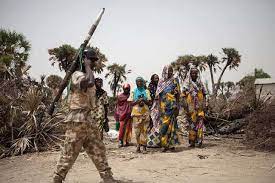The security challenge in Nigeria appears to be an insurmountable problem and some citizens feel the government is not doing enough to confront the menace.
BattaFiles understands that despite several trillion allocated to defence in the last few years, insecurity continues to increase in Nigeria.
In this report, we analyse some of the reasons why Nigeria still battles insecurity.
Arms proliferation
Proliferation of arms is occasioned by porous borders and unless the government mops up illicit arms circulating in its territory, Nigerians’ hope of sleeping with their two eyes closed would remain elusive.
Abdulsalami Abubakar, a former head of state, once said “the proliferation of all calibre of weapons, not only in our sub-region in general and in Nigeria, in particular, is worrying. It is estimated that there are over six million of such weapons in circulation in the country.”
In a March 2017 report titled, ‘The Human Cost of Uncontrolled Arms in Africa’, Oxfam estimated that Nigeria had two million small and light arms in the hands of non-state actors.
An Africa-focused geopolitical research firm, SBM Intelligence, in Oct. 2020 also raised alarm that the proliferation of small arms and ammunition was driving the increasing rate of violence in Nigeria.
The firm in a report titled, ‘Small Arms, Mass Atrocities and Migration in Nigeria’, said “the number of small arms in circulation in Nigeria, in the hands of civilian non-state actors is estimated at 6,145,000, while the armed forces and law enforcement collectively account for 586,600 firearms.”
Poverty and inequality
Poverty is defined by the World Bank (Haughton and Khandker, 2009, p. 1) as a ‘pronounced deprivation in well-being’. There are over 90 million Nigerians living below one dollar per day.
Research has shown that high rates of poverty could make unemployed youths vulnerable to recruitment by terror groups.
READ ALSO:
ANALYSIS: Will N2.74 trillion budgeted for security help Nigeria fight insurgency amid corruption?
2023: Five Problems Nigeria’s Next President Should Be Prepared To Address
Analysing The Deadly Activities Of Nigerians Exporting Cultism Abroad
According to Oxfam, inequality in Nigeria had significantly worsened, with the upper class benefiting from dubious tax waivers and legislators receiving earnings that were among the highest in the world, a development that has forced the poor into criminal activities such as kidnappings.
Corruption
In a report published on Jun. 13, the Centre for Democracy and Development (CDD) said “hollowed out by strategic-and operational-level corruption, Nigeria’s military and police appear incapable of safeguarding many parts of the country.
“The normalisation of security sector corruption means that military and police leaders’ failures offer them new opportunities to racketeer and profiteer, as well as embezzle from increased emergency security spending.”
There are many reports on massive corruption that characterised the fund’s use, making security operatives perform poorly in its fight against insecurity.
Public office holders use insecurity as a campaign weapon to pave the way to their political positions but the crisis always remains. Unless all the aforementioned are addressed, winning the war against insecurity would be difficult.





